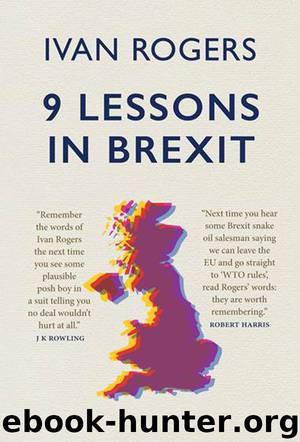9 Lessons in Brexit by Ivan Rogers

Author:Ivan Rogers
Language: eng
Format: epub
ISBN: 9781780724003
Publisher: Short Books
You cannot simultaneously argue that it is perfectly fine to leave a deep free trade agreement with easily our largest export and import market for the next generation, and trade solely on WTO terms because that is how we and others trade with everyone else… and argue that it is imperative we get out of the EU in order that we can strike preferential trade deals with large parts of the rest of the world, because the existing terms on which we trade with the rest of the world are intolerable.
If moving beyond WTO terms with major markets represents a major step forward in liberalising trade, then deliberately moving back to WTO terms from an existing deep preferential agreement – which is what the Single Market is – represents a major step backward to less free trade. You really can’t have it both ways.
I say “you cannot” argue this, but clearly many can and do. It is beyond incoherent.
It is fine and legitimate to argue that the UK should aim at a global lattice-work of bilateral and plurilateral free trade deals – especially in the current absence of an ability to drive forward major multilateral trade liberalisation through the WTO at a time when the US has manifestly ceased to be interested in it, and may indeed be setting about deliberalising trade, undermining the organisation and regretting having allowed China into it.
It is equally legitimate to argue, as I mentioned earlier, that you only want free trade deals which stop well short of the intrusion on national sovereignty, which Single Market harmonisation and mutual recognition via supranational legislation, adjudication and enforcement entails. As long as you also recognise that all trade deals inevitably erode and trammel one’s sovereignty to some degree – often to a significant degree.
If you make binding international commitments to opening your markets – on goods, services, government procurement, whatever – in return for other states making equally binding commitments, which open up opportunities for your firms in their markets, that seriously limits your capacity to regulate sectors of the economy as you might ideally see fit.
Genuinely free global trade actually seriously trammels national sovereignty. That’s why the old advocates of “socialism in one country” were never keen on trade liberalisation, whether in multilateral or bilateral deals.
Indeed, the greatest reason to be a passionate free trader – which I am – is surely that: it curtails the ability of myopic politicians to erect barriers to commerce in the name of sovereignty and national preference against non-national producers.
This is why our current debate on sovereignty and “taking back control” is often frankly so bizarre. It is just comical listening to right-wing populist politicians claiming they are avid free traders and simultaneously saying that one of the purposes of taking back control is to be able to rig domestic markets/competitions in favour of British suppliers/producers.
Protectionism is always someone else’s sin, of course.
And the Tory Party has been through these – decades-long – spasms before. Joseph Chamberlain’s Tariff Reform and
Download
This site does not store any files on its server. We only index and link to content provided by other sites. Please contact the content providers to delete copyright contents if any and email us, we'll remove relevant links or contents immediately.
| Arms Control | Diplomacy |
| Security | Trades & Tariffs |
| Treaties | African |
| Asian | Australian & Oceanian |
| Canadian | Caribbean & Latin American |
| European | Middle Eastern |
| Russian & Former Soviet Union |
The Secret History by Donna Tartt(16617)
The Social Justice Warrior Handbook by Lisa De Pasquale(11489)
Thirteen Reasons Why by Jay Asher(7785)
This Is How You Lose Her by Junot Diaz(5764)
Weapons of Math Destruction by Cathy O'Neil(5034)
Zero to One by Peter Thiel(4823)
The Myth of the Strong Leader by Archie Brown(4789)
Promise Me, Dad by Joe Biden(4444)
Stone's Rules by Roger Stone(4415)
Beartown by Fredrik Backman(4411)
How Democracies Die by Steven Levitsky & Daniel Ziblatt(4396)
The Fire Next Time by James Baldwin(4340)
100 Deadly Skills by Clint Emerson(4075)
A Higher Loyalty: Truth, Lies, and Leadership by James Comey(4031)
Rise and Kill First by Ronen Bergman(4012)
The David Icke Guide to the Global Conspiracy (and how to end it) by David Icke(3880)
The Farm by Tom Rob Smith(3871)
Secrecy World by Jake Bernstein(3782)
The Doomsday Machine by Daniel Ellsberg(3730)
